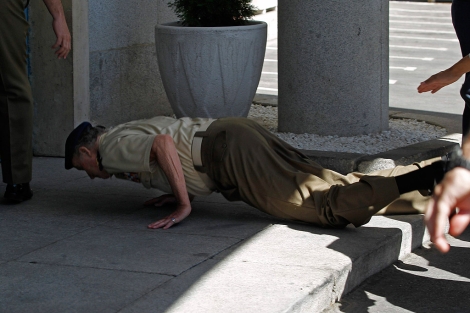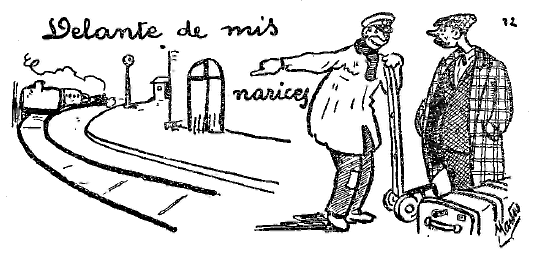
| Языки :: Испанский |
| Аудио |
 |
|
|
193 |
Español |
Spanish |
|
Lección Setenta y dos (72) |
||
| Un viaje a París (1) | A journey to Paris. | |
| 1 |
Don Bernabé creía que en Paris podría vender bien sus
antigüedades; pero no se decidla a ir solo de miedo a que le engañaran (2), |
Don B. thought that in P. he could sell his curios easily; but he did not make up his mind to go alone, for fear [at that] they should cheat him. |
| 2 |
¿Sabe usted lo que voy a hacer? me dijo. — ¿Qué? — Irme a Paris con mis compras. — Muy bien. |
Do you know what I'm going to do? he said to me. — What? — Go to Paris with my purchases. — Very well. |
| 3 |
¿Usted no tiene que ir a Paris por algo, don Luis? — Yo, no. — Vamos, le pago a usted el viaje. — No, no. Tengo aquí mis negocios. |
Have you not to go to P. for some reason [thing], D. Luis? — I? No. — Come (then), I pay the journey for you. — No, no, I have my business here. |
| 4 |
Insistió e insistió, y al fin quedamos (3) en que él me daría mil pesetas para el viaje : |
He insisted and insisted, and in the end we agreed [remained in] that he would give me 1.000 pesetas for the journey... |
| 5 | ida y vuelta y estancia (4), y el diez por ciento de la venta. | there and back, and the stay and ten per cent on the sale. |
| 6 |
Yo le acompañaría en Paris a hacer todas las gestiones (5)
necesarias para el negocio; pero luego quedaría libre. |
I should accompany him in Paris to take all necessary steps for the business; but afterwards I should be [remain] free. |
| 7 | Nada de imposiciones (6) ni de vida en común. | There would be no question [Nothing of] obligations nor life in common. |
| 8 |
Cada cual comería y cenaría donde quisiera (7) y se las arreglaría a su modo. — Aceptado, dijo él. |
Each of us [each who] would lunch and dine where he liked and would do [manage
them] in his own way. — Agreed, he said. |
| 9 |
Don Bernabé y yo decidimos que iríamos a París al comienzo del otoño (8). (Pío Baroja.) |
D. B. and I decided that we should go to Paris at the beginning of autumn. (Pío Baroja.) |
| EJERCICIOS | EXERCISE : | |
| 1 | Aranjuez, segunda, ida y vuelta. | Aranjuez, second-class, return. |
| 2 | Dése prisa, señor, que sale el tren dentro de dos minutos. | Hurry up, sir, the train leaves in two minutes. |
| 3 |
Voy corriendo. — ¿En qué vía (andén) está el tren para Aranjuez? |
I'm running. — On which platform is the train to Ar.? |
| 4 | Andén segundo; corra usted, que va a salir. | Platform 2; run, it*s going to start. |
| 5 | ¡Uf! ya estamos aquí, y por suerte hay un rincón libre. | Ah ha (=what a relief!). Here we are and by luck there is a corner unengaged. |
| 6 |
Menos mal que no tenía equipaje que facturar; si no, hubiera perdido el tren (or : el tren se hubiera ido delante de mis narices). |
And it's lucky [less bad] that I had no luggage to register; if not, I should have missed the train (or : the train would have started [gone] before my nose. |
| NOTES. | |
| 1 | A passage from a novel by Pío Baroja, one of the most appreciated Spanish writers. |
| 2 |
Don't forget that ü is sounded (oo) after g. — De miedo a que, for fear that; temiendo que..., fearing that (lest). |
| 3 |
¿ En qué quedamos?, "in what do we remain", what do we
agree on, then? — Let us recall that in verbs in ar the 1st persons plural of the present and preterite are alike. Tomamos means : we take or we took according to the meaning of the sentence. |
| 4 |
La estancia, the stay, sojourn (from estar); la estación, the (railway) station or the season. |
| 5 | Gestiones (Hestee_owness) = pasos, diligencias. |
| 6 | Imposiciones = obligaciones = cargas (charges). |
| 7 |
Yo quiero, usted quiere, I, you want; yo quisiera, Vd. quisiera, I should like [want], you would like [want]. — Cada cual = cada uno. |
| 8 |
In verbs in ir, too, present and preterite are alike (1st pers.
plur.) : Decidir, to decide; decidimos, we decide or decided. — There is a difference in the verbs in er only : Beber, to drink; bebemos, we drink; bebimos, we drank. — Al comienzo = al principio. |
|
La nariz, the nose, is often found in the plural : las
narices. Se ha caído de narices : he has fallen on his nose. |
